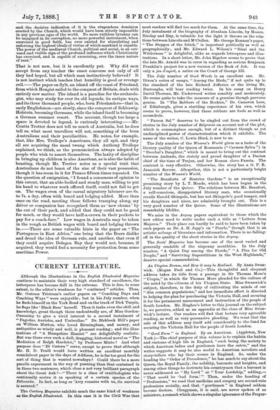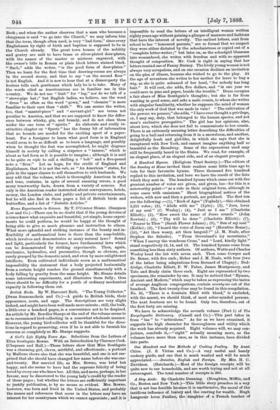"Good Form" in England. By an American. (Appleton, New York.)—The
chief purpose of this volume is to explain the habits and customs at high life in England, "such being the society to which American ladies and gentlemen have the entrée," and the writer suggests it may be also useful to American novelists and story-tellers who lay their scenes in England. So, under the heading the "Order of Precedence," he has much to say about the Queen, the Royal Family, the nobility, baronets and knights, and among other things he instructs his countrymen that a baronet is never addressed as "My Lord" or "Your Lordship," adding,— " That would be 'bad form.' " Then, under the heading of "professions," we read that medicine and surgery are second-rate professions socially, and that "gentlemen" in England seldom become doctors. Clergymen, it is said, are never spoken of as ministers, a remark which shows a singular ignorance of the Prayer- Book ; and when the author observes that a man who becomes a clergyman is said "to go into the Church," we may inform him that the term, though often used, is very "bad form," since every Englishman by right of birth and baptism is supposed to be in the Church already. The great town houses of the nobility and gentry are said to have brass or silver-plated door-plates, with the names of the master or mistress engraved, with the owner's title in Roman or plain block letters stained black. "Such," adds the writer, "is the good form of door-plates." Then we learn for the first time that drawing-rooms are always in the second storey, and that to say "on the second floor" is not English. And it is new to hear that at a dinner-party the hostess tells each gentleman which lady he is to take. Many of the words cited as Americanisms are in familia.* use in this country. We do not use " limb " for "leg," nor do we talk of a "stove-pipe hat;" but English ladies, we believe, use the word " dress " as often as the word "gown," and " chemise " is more familiar to their ears than "shift." We can assure the writer, too, that " mantel-piece " and "servant-girl" are terms not peculiar to America, and that we are supposed to know the differ- ence between whisky, gin, and brandy, and do not class them under the one term of "spirits." An elaborate and really in- structive chapter on " Sports " has the funny bit of information that no hounds are needed for the exciting sport of a paper- hunt. For a foreigner to learn what good form is in England would seem to be as difficult as to learn a language, and possibly when he thought the feat was accomplished, he might disgrace himself in society by calling a sixpence a "tanner," which is about as bad form as it is possible to imagine ; although it is said to be quite en regle to call a shilling a " bob " and a five-pound note a "flyer." Let us hope, for the credit of England and Englishmen, that it is not the rule, as "An American" states, for girls in the upper classes to sell themselves to rich husbands. We may add that the volume, which is thoroughly American in style and tone, contains, in spite of several amusing errors, a good many trustworthy facts, drawn from a variety of sources. Not only is the American reader instructed about conveyances, hotels, money, the London clubs, and public and private entertainments, but he will also find in these pages a list of British birds and butterflies, and a list of "Dutiable Articles."



































 Previous page
Previous page